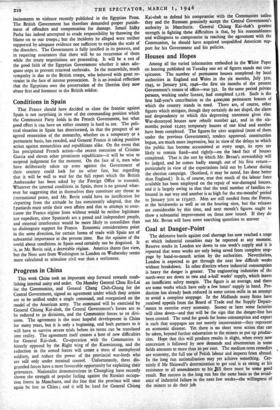Progress in China
This week China took an important step forward towards estab- lishing internal unity and order. On Monday General Chou En-Lai for the Communists, and General Chang Chih-Chung for the Central Government, signed an agreement under which their armies are to be unified under a single command, and reorganised on the model of the American army. The command will be exercised by General Chiang Kai-shek, the Central Government's forces are to be reduced to 50 divisions, and the Communist forces to to divi- sions. The agreement is the most hopeful development in China for many years, but it is only a beginning, and both partners to it will have to survive severe trials before its terms can be translated into reality. The agreement itself creates a host of new difficulties for General Kai-shek. Co-operation with the Communists is bitterly opposed by the Right wing of the Kuomintang, and the reduction in the armed forces will create a mass of unemployed soldiery, and reduce the power of the provincial war-lords who are still only under nominal control. Unfortunately, these dis- gruntled forces have a most favourable opportunity for exploiting their grievances. Nationalist demonstrations in Chungking have recently shown the strength of popular feeling against the Russian occupa- tion forces in Manchuria, and the fear that the province will once again be lost to China ; and it will be hard for General Chiang Kai-shek to defend his compromise with the Communists unless they and the Russians genuinely accept the Central Government's authority in Manchuria. General Chiang Kai-shek's greatest strength in fighting these difficulties is that, by his reasonableness and willingness to compromise in reaching the agreement with the Communists, he should have acquired unqualified American sup- port for his Government and his policies.


























 Previous page
Previous page